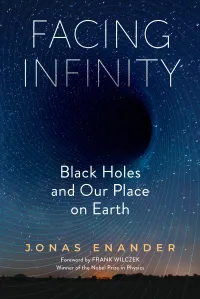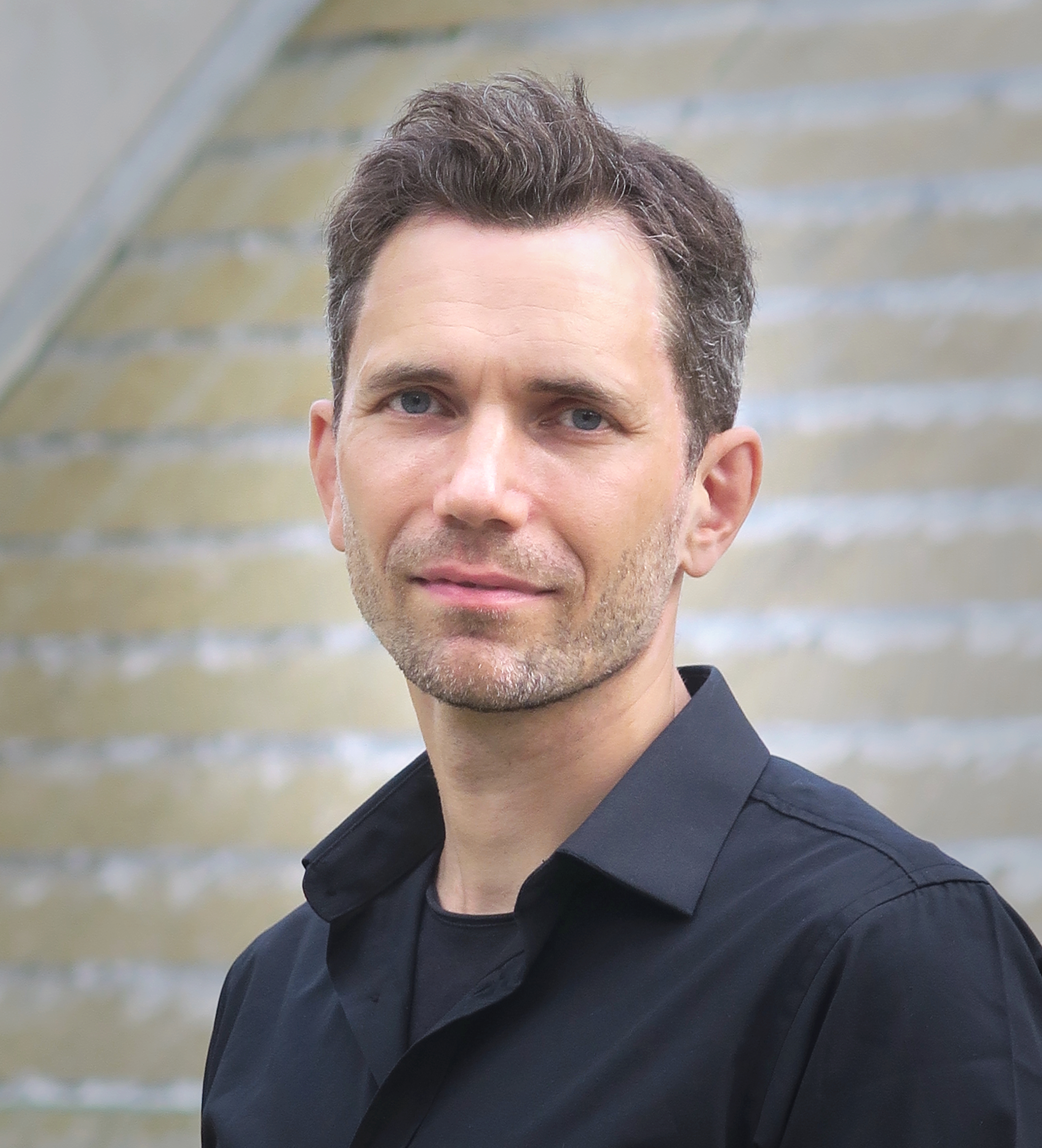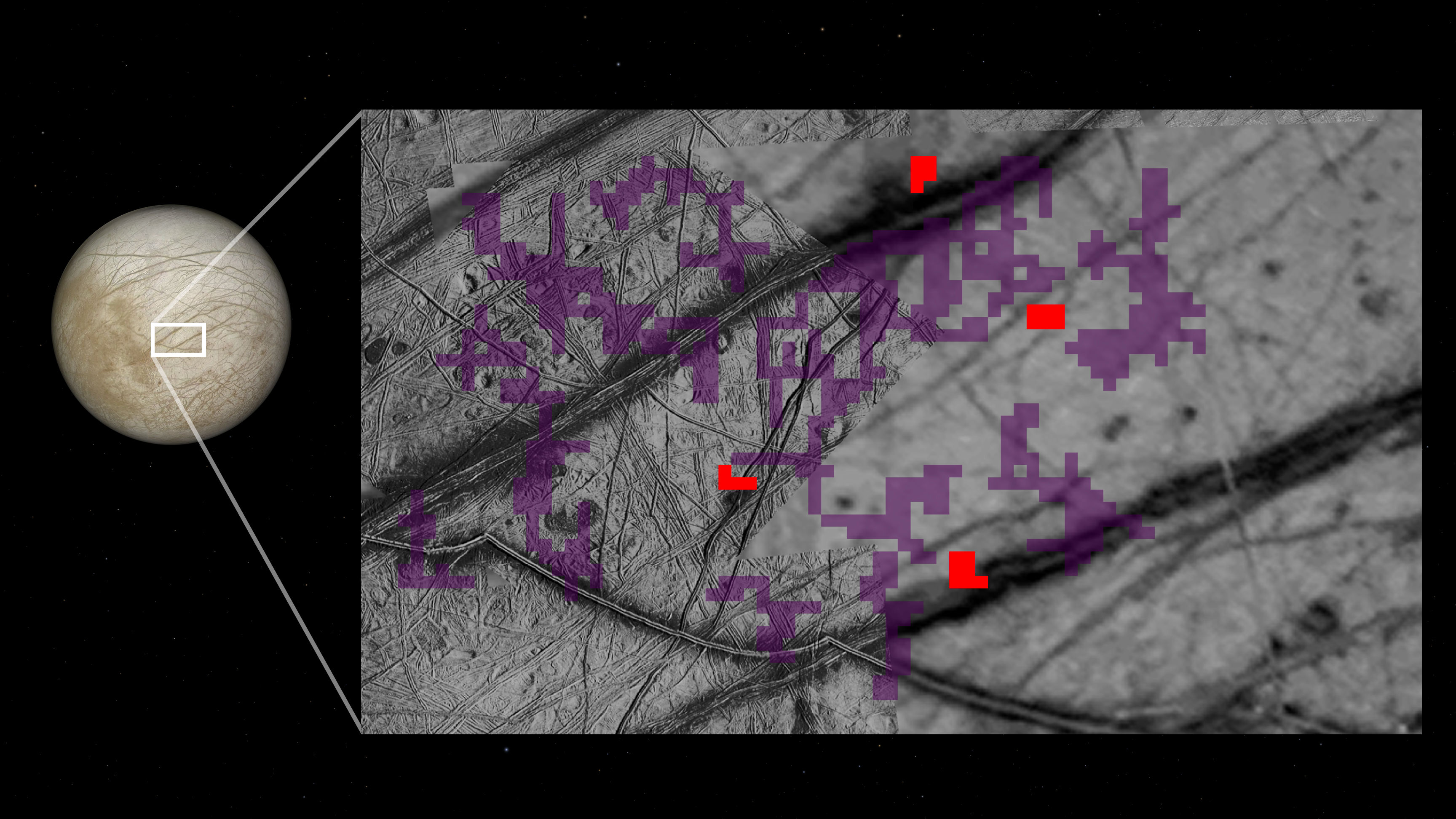'Torn apart by the darkness': What would happen if a human fell into a black hole?
What would a human see and feel while falling into a black hole? In this exclusive excerpt of his new book, "Facing Infinity," author and astrophysicist Jonas Enander tells us in terrifying detail.
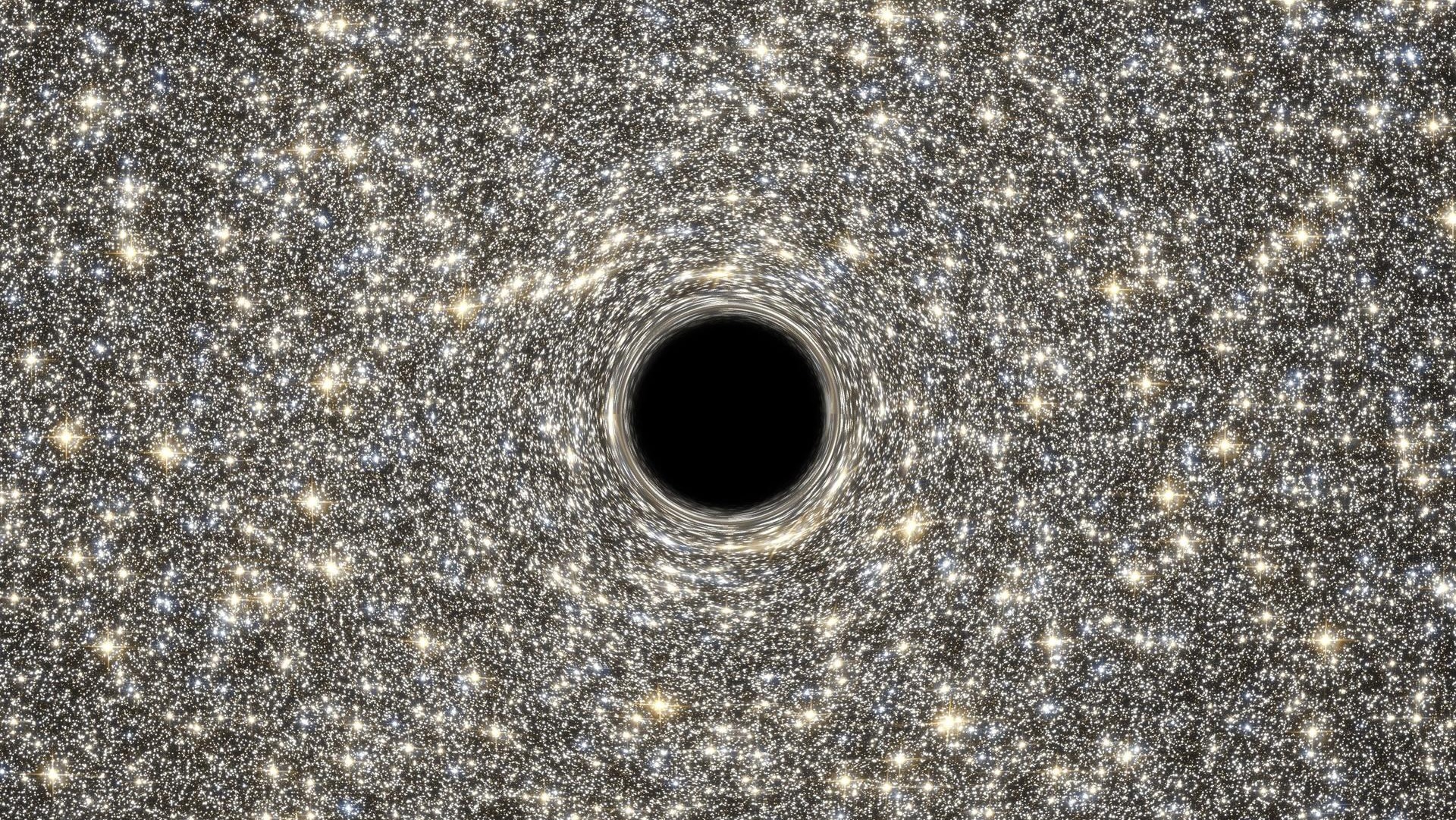
Get the world’s most fascinating discoveries delivered straight to your inbox.
You are now subscribed
Your newsletter sign-up was successful
Want to add more newsletters?

Delivered Daily
Daily Newsletter
Sign up for the latest discoveries, groundbreaking research and fascinating breakthroughs that impact you and the wider world direct to your inbox.

Once a week
Life's Little Mysteries
Feed your curiosity with an exclusive mystery every week, solved with science and delivered direct to your inbox before it's seen anywhere else.

Once a week
How It Works
Sign up to our free science & technology newsletter for your weekly fix of fascinating articles, quick quizzes, amazing images, and more

Delivered daily
Space.com Newsletter
Breaking space news, the latest updates on rocket launches, skywatching events and more!

Once a month
Watch This Space
Sign up to our monthly entertainment newsletter to keep up with all our coverage of the latest sci-fi and space movies, tv shows, games and books.

Once a week
Night Sky This Week
Discover this week's must-see night sky events, moon phases, and stunning astrophotos. Sign up for our skywatching newsletter and explore the universe with us!
Join the club
Get full access to premium articles, exclusive features and a growing list of member rewards.
Thank your lucky stars for black holes. Mysterious, terrifying and endlessly fascinating, these extreme objects are the gravitational anchors of every large galaxy – including our own — and help regulate star formation across the cosmos. They are the darkest objects in the universe, and yet curious Earthlings are drawn to them like moths to a 100,000 solar mass flame.
In his new book "Facing Infinity: Black Holes and Our Place on Earth" (The Experiment, 2025), science writer and physicist Jonas Enander invites us on a journey through time and space to unravel the history, the science and the enduring mystique of black holes. From a volcano-top observatory in Hawaii that helped capture the historic first image of a black hole to a World War I battlefield in France where one of the most important astrophysical equations was conceived, Enander speaks with Nobel laureates and retraces the steps of some of the greatest thinkers in physics to help put these monstrous cosmic objects into a tangible, human context.
The journey begins at a terrifying end — with an unfortunate astronaut falling into a black hole's maw. Read an exclusive excerpt of "Facing Infinity" below.
The light blinds you.
You raise your hands to shield your eyes, letting fragments of light filter between your fingers. White, blue and red stars are shining brightly in the darkness.
You're floating in space. There's no up or down.
Thick white gloves cover your hands. They are part of your spacesuit, your only protection from the deadly vacuum that surrounds you.
Get the world’s most fascinating discoveries delivered straight to your inbox.
You lower your hands and squint. In the starfield in front of you, you see a darkness. There are no stars there. There's no light, nothing but cold, black emptiness: a black hole.
A black hole is a place in the universe with such strong gravity no light can escape it. That's why black holes are dark. But the darkness not only signifies the absence of light, it also represents a limit of knowledge. No particles, no radiation and no other information can exit a black hole. If you want to know what is going on in the darkness, you have to travel right into it.
You realize that the darkness in front of you has grown. You are falling towards it and there is nothing you can do to stop yourself. You have no spaceship, no rockets, no way to alter your course.
The darkness feels both menacing and alluring. Like the explorers of old, you are venturing into the unknown. You are going to find out what happens in one of the strangest places in the universe, a place no one else has ever visited.
But there's a difference between you and those adventurers: after they had explored far-away places, they could return home and describe what they had seen. You will not be able to travel back and tell your fellow humans what you've been through. Once you've fallen into the black hole, you can never turn back. Its gravitational pull is too strong. The darkness will swallow you forever.
All you can feel is your spacesuit bumping against your body, and all you can hear is your breath, though you start to perceive a thudding noise that has grown louder as the darkness has deepened. You realize it's the sound of your heart.
Jonas Enander, Facing Infinity
You're falling into an abyss of space and time that has an enormous gravitational pull. But falling in space is not the same as falling on planet Earth. On Earth you can feel the air rushing past your face and hear your clothes fluttering in the wind. In the emptiness of space, however, there is no air and no sound. All you can feel is your spacesuit bumping against your body, and all you can hear is your breath, though you start to perceive a thudding noise that has grown louder as the darkness has deepened. You realize it's the sound of your heart, beating harder and harder the closer you get to the black hole. It's as though your heart fears what you will meet in the darkness, as though it knows you will have to sacrifice something in order to see what is happening inside.
Knowledge comes at a cost. The greater the knowledge, the higher the price. To find out what happens in one of the darkest and most peculiar places in the universe, you will have to pay the highest price of all: your life.
The point at which this will happen depends on the size of the black hole. The larger it is, the longer you can survive. The black hole you are falling towards right now is almost as big as the solar system. You can pass through its surface painlessly, but after that, your life will be over in only a few hours.
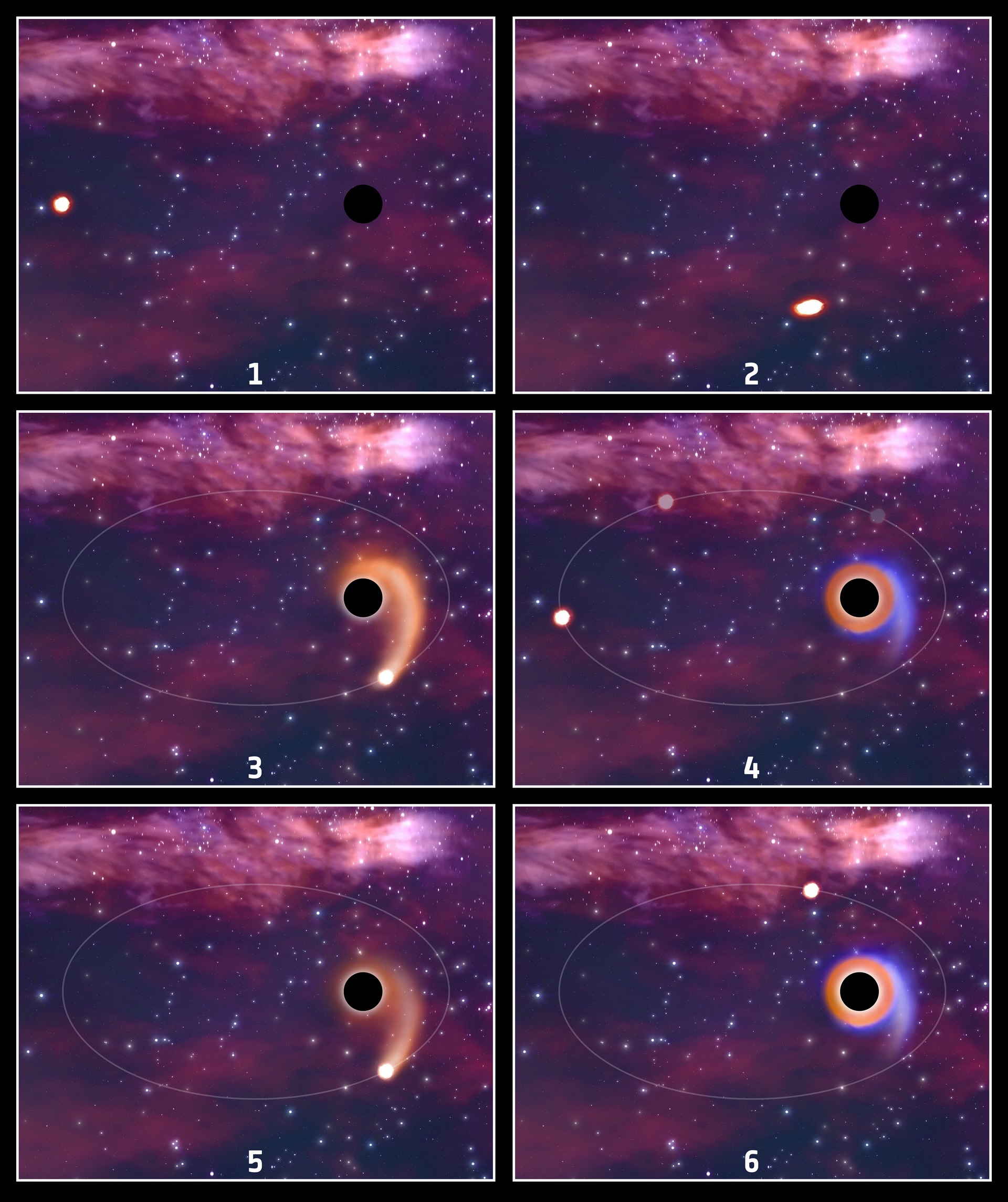
Your field of vision is increasingly taken up by the dark sphere. As the darkness grows, the light around it seems to change. You see multiple copies of the light from the stars appear on either side of the black hole. At the same time, the stars' light seems to grow brighter, becoming compressed along the edge of the black hole. It occurs to you that the darkness is controlling the light. The black hole's powerful gravity is making the stars' light travel along peculiar paths that multiply its radiance. Phantom stars form in space, like mirages in the desert. These strange star-doubles disorient you. You want to tell your friends how the encroaching darkness fills you with terror, how the light of the stars is distorted and how helpless you feel. But even if you had a radio transmitter, you wouldn't be able to send your friends a message after you'd passed the event horizon. You will have to bear those final moments in the darkness alone.
Deep within the abyss, there is a point so extremely dense it is hard to wrap our minds around what goes on there. This point is called the singularity. Everything that passes the event horizon will ultimately reach the singularity. There, all matter and all light will be concentrated in a state that is so distorted, even space and time seem to cease to exist.
You are gaining speed as you fall towards the darkness. There is nothing you can do to avoid it. You turn your head and look around you. The area of space behind you is growing darker and darker. You lose your ability to orient yourself. You cannot tell where you came from, or how far you are from the black hole. Are you already inside it? You don't know. There's no sign at the event horizon that says 'You are now passing the point of no return.'
... everything in your body is drawn out, from your skeleton, your tendons and your muscles, all the way down to your nerves, cells and DNA.
Jonas Enander, Facing Infinity
The dark sphere seems to surround you in every direction. You flail your arms and legs in a desperate attempt to escape your journey towards the singularity, but it's pointless. There's no escaping the singularity. All that happens is that you start sweating.
You close your eyes, take a deep breath and think about what awaits you. When you travel feet-first towards a black hole, your lower body will feel a greater force than the upper body. You begin to be pulled apart. But it doesn't happen the same way as on a torture rack; instead, everything in your body is drawn out, from your skeleton, your tendons and your muscles, all the way down to your nerves, cells and DNA. Luckily, you'll feel almost nothing when it happens. From the moment you first notice the pain shoot through you, less than a second will pass before you are decimated. But unlike on Earth, where a person's dead body can be buried, there will be nothing left of you. Your body will be dissolved into the darkness.
The smell of your own sweat fills your spacesuit. You try to take deep breaths, but hear yourself breathing faster and faster. Pain flashes from your feet to your head. You tense every muscle in a final attempt to stop your body being strung out.
You open your eyes. The light of a billion stars blinds you. They are outside the black hole, but their light has been concentrated into a thin ring inside it. The ring is caught between the darkness in front of and behind you. You are in the centre of the ring.
Before you can even scream, your last second of life has passed.
You’ve been torn apart by the darkness.
Excerpt from Facing Infinity: "Black Holes and Our Place on Earth" © Jonas Enander, 2025. Translation copyright © Nichola Smalley, 2025. Reprinted by permission of the publisher, The Experiment. Available everywhere books are sold.
Physicist Jonas Enander traces humanity's fascination with black holes from their first conception in the 18th century to the modern era of cosmic imaging, uncovering how our quest to understand them has reshaped science and society alike.
Jonas Enander is a Swedish science writer covering physics and astronomy. He is the author of Facing Infinity: Black holes and our place on Earth (Atlantic Books/The Experiment, 2025). His articles have appeared in outlets including New Scientist, Big Think, Space.com as well as various Swedish magazines. He has a background as a researcher in the field of cosmology and astrophysics, with a particular focus on dark energy, dark matter and Einstein's theory of general relativity.
You must confirm your public display name before commenting
Please logout and then login again, you will then be prompted to enter your display name.
 Live Science Plus
Live Science Plus





